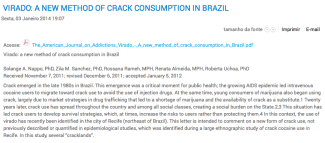Search
Substances
How to Implement Effective School-Based Drug Education
Treatment for Opioid Use Disorder: What's There to Learn?
This misuse of prescription opioids is a major public health challenge. Buprenorphine-naloxone (bup-nx) is typically used to treat opioid use disorders. However, the drug’s clinical trial primarily involved heroin users. It was therefore...
Can Depression Lead to E-Cigarette Use?
There remain many unanswered questions regarding the health effects of e-cigarettes. A new study published in the journal Nicotine & Tobacco suggests that there may be a link between e-cigarette use among university students and depression...
Affluence and Academic Pressure: Two Factors That Lead to Drug Abuse?
A new study published in the journal Development and Psychopathology claims to have found a positive link between affluence, high academic performance and drug and alcohol use.
Such findings are important because it has previously only...
A Possible New Treatment for Alcohol Disorders?
New research published in the journal Biological Psychiartry points to a novel way for the treatment of alcoholism. This would look to reduce motivation for drinking instead of altering the effects of alcohol, itself. Indeed, the study...
How Do We Tackle the Opioid Epidemic?
The over-prescription of opioids is a significant public health issue in the United States. For example, opioids are often prescribed for minor injuries unnecessarily. This, in turn, increases the risk of addiction.
New research presented...
Receptivity to Tobacco Ads Linked to Smoking Susceptibility Among Youth
There is a strong link between receptivity to tobacco product advertisements and susceptibility to smoking cigarettes later in life, according to new research published in the journal Pediatrics. Put simply, the study suggests that the more...
Technology and Smoking Cessation: Are Personalised Emails Effective for Would-be Quitters?
A new American Cancer Society study published in the journal Tobacco Control suggests that regularly receiving personalised emails with tips for quitting amongst other information could be as effective at reducing the rate of smoking as...
Excessive Drinking: More a Result of Low Socioeconomic Status Than Access to Alcohol?
Among US neighbourhoods, poverty and disorganisation, that is high levels of crime, drug trafficking and graffiti etc., may increase the risk of problem drinking, more so than the presence of bars or stores that sell alcohol.
In other...
Treatment of Skid-Row Alcoholics with Disulfiram
Conducted in 1962 and 1963 in Atlanta in the USA, the featured article seems the first to have tested whether problem-drinking offenders will take a drug which enforces abstinence by generating deterrent reactions to alcohol, if the...
Adult Substance Misuse Statistics from the National Drug Treatment Monitoring System (NDTMS)
This report brings together information on people receiving specialist interventions for drug problems and for problem drinking in England, other than patients receiving this treatment in prison.
Analysed textually and pictorially through...
State HCV Incidence and Policies Related to HCV Preventive and Treatment Services for Persons Who Inject Drugs — United States, 2015–2016
Summary
What is already known about this topic?
The United States has experienced a sharp increase in hepatitis C virus (HCV) incidence that can be attributed to injection drug use. Some states have used public health laws and treatment...
Free Harvard Medical School E-Courses on Opioid Addiction for Beginners to Healthcare Professionals
Opioid addiction is a major problem in the US.
In this way, Harvard Medical School (HMS) has introduced a new online course entitled OpioidX: The Opioid Crisis in America.
OpioidX is the first free, comprehensive educational programme on...
Extending the Reach of Treatment for Opioid Use Disorders into Rural Areas
A new study published in the Journal of Addiction Medicine suggests that a tele-psychiatric approach which uses video-link technology in combination with medicinal treatment in the form of buprenorphine could be as effective as the usual...
Can Medical Marijuana Promote Illegal Use?
Illegal marijuana use and reported cases of addiction have increased more rapidly in US states that passed laws to introduce medical marijuana compared to those that did not. This is according to new research to be published in the journal...
Does Plain Packaging Cause a Reduction in the Prevalence of Smoking?
Tobacco is the number one cause of preventable death worldwide. A recently published Cochraine Review has found that standardised, or plain, tobacco packaging could make tobacco products less appealing and, in turn, lead to a reduction in...
Now Available: European Facility Survey Questionnaire (EFSQ) Package
The European Facility Survey Questionnaire (EFSQ) can be used for data collection in any country by those looking to investigate facilities that provide interventions for drug users.
Its aim is to collect information on facilities in...
Aggression Linked to Substance Use
New Research published in the Journal of Clinical Psychiatry has found that people with intermittent explosive disorder (IED) – a condition with a significant genetic component characterised by regular outbursts of aggression, whether...
'Virado': A New Method of Crack Consumption in Brazil
Crack emerged in the late 1980s in Brazil. This emergence was a critical moment for public health; the growing AIDS epidemic led intravenous cocaine users to migrate toward crack use to avoid the use of injection drugs. At the same time...
Higher Taxes Needed to Lower Smoking Rates in South Asia
New research published in The British Medical Journal supports the need to increase taxes on tobacco products in South Asia, suggesting that doing so could reduce consumption by at least 1/3 and, in turn, avoid around 35 - 45 million...
Share the Knowledge: ISSUP members can post in the Knowledge Share – Sign in or become a member






